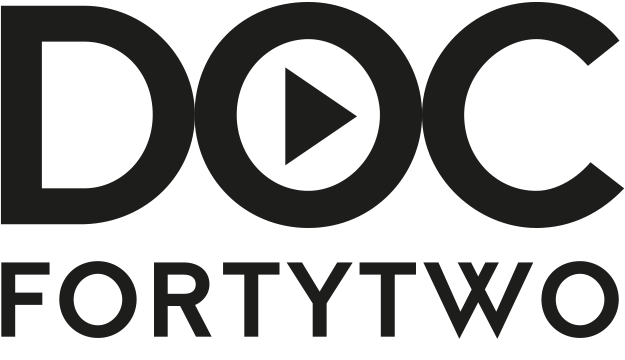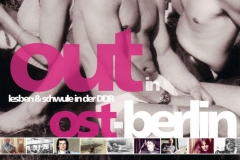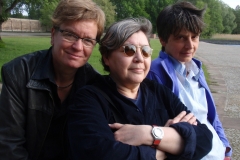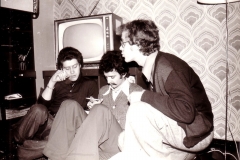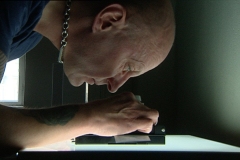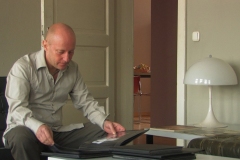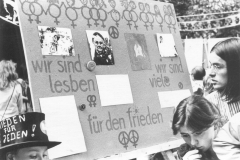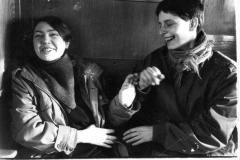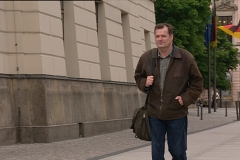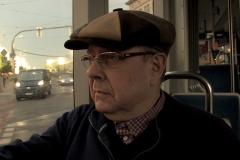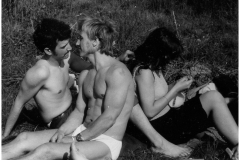In 1968, paragraph 175, which made homosexual behavior punishable by law, was abolished in the German Democratic Republic. At first homosexuality was considered a negligible, somehow suspicious issue in ‘real existing socialism. The nuclear family constituted the center of social society. “Out in East Berlin” tells the various, impressive-to-absurd personal histories of gay men and lesbians during socialistic GDR until the fall of the Berlin Wall. Their experiences on the path to a self-conscious, outed sexual identity share one specific perspective: They are accompanied by the watchful eye of the Ministry of State Security (Stasi), which reached even their actions in bedroom. Even their actions in the bedroom were recorded in innumerable personal files. Based on the homosexual perspective, filmmakers Jochen Hick and Andreas Strohfeldt elucidate the political picture of the GDR, in which citizens are monitored, spied upon and whose movements are restrained. In addition, they are called upon to betray one’s own cause: homosexual emancipation.
An exciting, fascinating and vivid portrait of society is created from impressive interviews, situational scenes and historical material never shown before. A film that especially today possesses actuality and explosiveness.
Unlike in the Federal Republic, by 1968 homosexuality was already de-criminalized in the German Democratic Republic’s penal code. But the ‘workers’ and farmers’ state’ did not exactly welcome its gay and lesbian citizens with open arms; their sexuality was taboo and they were often marginalized from public life. The generation of gay men and women, who had seen the war and were now trying to live lives of inconspicuous normality felt threatened by younger homosexuals who came out and demanded spaces in which to express themselves. Thirteen moving biographies depict the private and political developments which led to opposition against the state apparatus.
The founders of East Berlin’s LGBT movement, the ‘terror lesbians’ from Prenzlauer Berg, gay Communists and church groups – they all wanted to change the system and hoped for a society in which they could be more open about their sexuality. When the first homosexuals began applying to leave the GDR they became a problem and ‘Stasi Romeos’ started schmoozing young gay men.
Archive news footage and excerpts from old GDR newsreels illustrate the historical dimension of these individual biographies. (from Berlinale catalogue)
CAST
Peter Bausdorf, Bettina Dziggel, Michael Eggert, Andreas Fux, Marinka Körzendörfer, Marina Krug, Klaus Laabs, Jürgen Litfin, Gerhard Plose, Christian Pulz, Michael Raimann, Peter Rausch, Eduard Stapel, Peter Tatchell and many others.
CREW
Written and directed by Jochen Hick & Andreas Strohfeldt
Camera: Jochen Hick & Thomas Zahn
Sound assistant: Björn Geldermann
Editing & Motion Design: Thomas Keller
Assistant Editor: Gilles Lasnet
Music: Stefan Kuschner & Matthias Koeninger
Music advice: Michael Kramer & Christoph Weber
Sound design & mixing: Jörg Theil & Michael Kaczmarek
Dramaturgy: Karin Wallenczus
Production consulting: Christian Jentzsch
Catering: Nadja Schallenberg, Gilles Lasnet
English subtitles: Joel Kirby
Movie poster: Tanja van de Loo
Production management: Hermann Hick
Production assistance: Ursula Scheid
Producer: Jochen Hick
Galeria Alaska Productions / Jochen Hick
Funded by:
Filmförderung Hamburg Schleswig‐Holstein
MFG Filmförderung Baden‐Württemberg
Jochen Hick
Jochen Hick was born in Darmstadt in Germany, between 1981 and 1987 he studied film at the University of Fine Arts of Hamburg and also in Bologna. He is a freelance writer, journalist, director and producer of film and television. From 2007 until 2010 he was commissioning editor and deputy director of programmes at TIMM television channel. He is also a part-time lecturer at the German Film and Television Academy Berlin.
Filmographe Jochen Hick (selection) as director, author and (excluding VIA APPIA) as producer:
1985 MOND ÜBER PITTSBURGH (short)
1987 GERD HANSEN, 55 (short)
1988-90 VIA APPIA (feature)
1991 TEUFEL IM PARADIES (docufeature)
1992 WILLKOMMEN IM DOM (short documentary) *
1995 MENMANIACS – The Legacy of Leather (documentary) *
1998 SEX/LIFE IN L.A. (feature documentary) *
2000 NO ONE SLEEPS (feature) *
2003 ICH KENN KEINEN (feature documentary) *
2005 CYCLES OF PORN (feature documentary) *
2005 AM ENDE DES REGENBOGENS/RAINBOW’S END (feature documentary)
2006 HALLELUJAH! (short)
2006 DEUTSCHLAND – EIN HERBSTMÄRCHEN (short)
2008 EAST/WEST – SEX & POLITICS (feature documentary) *
2009 THE GOOD AMERICAN (feature documentary) *
2013 OUT IN OST-BERLIN * (documentary – with Andreas Strohfeldt)
2016 DER OST-KOMPLEX * (documentary)
2017 MEIN WUNDERBARES WEST-BERLIN * (documentary)
* = Berlinale participation
Andreas Strohfeldt
Andreas Strohfeldt, born in 1962, studied in Moscow before moving to Saint Petersburg,
where he organised Queer Cinema screenings and retrospectives. He has written and
directed various short films.
Filmographie Andreas Strohfeldt (selection)
2008 EAST/WEST – Sex & Politics (directed by: Jochen Hick) – Assistant director *
2011 DDR UNTERM REGENBOGEN TV (45 min) (Assistant director, directed by: Jochen Hick)
2013 TRIFONOV – Poet & Rebel
* = Berlinale participation
INTERVIEW
Teddy TV Interview with Jochen Hick and Andreas Strohfeldt on the Berlinale 2013 (English).
OUT IN OST-BERLIN – Jochen Hick and Andreas Strohfeldt in a film talk on 11.04.2021.. Recording of the film talk on 11.04.2021 in the presence of the protagonists Bettina Dziggel, Christian Pulz, Peter Rausch and Wolfgang Beyer. Moderated by Erik Lemke.
PRESSESTIMMEN
Claus Löser in Berliner Zeitung from 31.10.2013
Johan Dehoust in Der Spiegel from 31.10.2013
Caroline M. Buck in Neues Deutschland from 31.10.2013
Ulrike Rechel in tip from 31.10.2013
Queer.de from 30.10.2013
Detlef Kuhlbrodt in taz from 31.10.2013
Stephen Dalton in Hollywood Reporter from 7.2.2013
Kulturspiegel from 31.10.2013
James Kirchick in SPIEGEL International on the 15.2.2013
Links and quotes from numerous other press articles here.
PROTAGONISTS (SHORT BIOGRAPHIES)
Peter Bausdorf
Born 1942 in Berlin. Puppeteer by profession. Bausdorf came out in the 1950s. He and his homosexual school friends described themselves as “enchanted”. The construction of the Wall separated him from his first boyfriend, who lived in West Berlin. He has been together with his current boyfriend Dieter for 48 years. Peter’s dream was to “lead a completely normal life”. With his circle of friends, he organised large parties with up to 50 guests with specially staged travesty shows.
Jürgen Litfin
Born 1937 in Berlin, Jürgen was the brother of Günther Litfin, who was shot dead by GDR border police on 24 August 1961 while attempting to swim to West Berlin through Humboldthafen. He was the first Wall victim killed by gunfire. In two defamatory news articles on 1st and 2nd September 1961, the NEUE DEUTSCHLAND described Günther Litfin as a “puppet”, a criminal homosexual who had sought out his victims in East Berlin. A memorial stone was donated to him in West Berlin. Jürgen Litfin vehemently pushes back against the rumour that his brother was a homosexual. Today, he runs a former wall tower as a memorial not far from Humboldthafen, where the memorial stone for his brother is also located. In 2001, the NEUE DEUTSCHLAND published a detailed article that focused on the events and reporting of 1961.
Marina Krug
born in 1960, grew up on the grounds of the Wilhelm Pieck Youth College at Bogensee, where her father taught Marxism/Leninism. She describes her childhood in this “political colony” as “fairytale-like”. At the age of 8, her family moved to Apolda near Erfurt, where she first experienced the daily reality of the GDR. At a very young age, she was more attracted to girls than boys and suffered from the lack of information and possible alternatives to convention.
During her studies at the HUB she met other lesbian women and experienced her coming out. She broke off her studies, got involved in a protest against the threat of compulsory military service for women in the GDR. In 1983 she founded the working group “Homosexual Self-Help – Lesbians in the Church” with other lesbian women at the Gethsemane parish. In April 1985, she was one of the organisers of the prevented wreath-laying ceremony for the lesbian victims of fascism at the former Ravensbrück concentration camp. She increasingly came into conflict with her family and the country they represented. In 1986 she turned her back on the GDR and has lived in West Berlin ever since. She teaches German to primary school pupils with an immigrant background.
Klaus Laabs
was born in 1950 in Berlin. His father was State Secretary for National Education in the 1950s. From an early age, Klaus was interested in politics and wanted to be “right at the top”. At the same time, he was permanently afraid that someone might guess his homosexuality. He studied diplomacy in Moscow, but was expelled after three years because he “didn’t fit in”. In 1979 he began a second degree at the HUB. He experienced his coming out and became involved in the gay and lesbian groups that emerged in the early 1980s. His aim was to discuss the gay issue within the SED. As a consequence, he was expelled from the party in 1984 and lost his professional prospects.
He distinguished himself as a literary translator and became a member of the GDR writers’ association. He maintained his committed critical distance from the GDR until its end. In 1988, the MfS initiated an operational procedure against him. In October 1989 he took an active part in the demonstrations against the party leadership. Klaus still works as a literary translator, mainly from Spanish.
Christian Pulz
Born in 1944, Pulz grew up in Bad Elster. He suspected he was homosexual from an early age, and developed feelings of fear and guilt that would shape his life for a long time. Through a friend he joined a Christian group and experienced a “lightning conversion”. During his theology studies in Leipzig, he got to know the gay flaps (public toilets). Due to the indiscretion of fellow students, his homosexuality became “notorious” in the theological seminary. The open hostility of most lecturers and fellow students forced him to drop out of his studies. He worked as a bookseller, and at the end of the 80s as a social welfare worker. At the beginning of the 80s in Leipzig at the Protestant Student Community, and later in Berlin – first in Hohenschönhausen, then at the Confessional Church in Berlin Treptow -, Pulz was involved in working groups with like-minded people in which lesbians and gays are committed to their emancipation (“Gays in the Church – Homosexual Self-Help Working Group”). During the 1983 peace workshop in Rummelsburg, the group made its first public appearance under the motto “Lieber ein warmer Bruder als ein kalter Krieger” (Better a warm brother than a cold warrior). After the fall of the Berlin Wall, Christian became a member of the Berlin House of Representatives from 1990 to 1995 and youth policy spokesperson for the Bündnis 90/Die Grünen parliamentary group.
Marinka Körzendörfer
was born in 1960 in Berlin. Her mother was active in the SED. Marinka was interested in politics even as a child. She could not understand why the Soviet army had invaded Czechoslovakia. “The first questions started.” She studied journalism at the KMU in Leipzig. It wasn’t until she was about 30 that she came out as a lesbian. She got involved in the working group “Homosexual Self-Help – Lesbians in the Church.” Together with Marina Krug and Bettina Dziggel, she was involved in the wreath-laying ceremony for the lesbian women murdered in the Ravensbrück concentration camp, which was thwarted by the state in April 1985. Marinka regretted that so many of the committed women left the GDR; a move to the West was out of the question for her. During the turnaround months of October/November 1989, she was involved in the contact telephone of the civil rights activists. Today she works as a librarian.
Peter Rausch
was born in 1950 in Berlin, the son of a communist workers’ family. He grew up in Frankfurt, then Stalin-Allee. After his military service with the NVA, he studied Electronics Technology at the HUB from 1971 to 1975 at the HUB. In his one-room flat on Rathausstraße in Berlin Mitte, next to the Red City Hall. He founded the HIB – Homosexuelle Interessengemeinschaft Berlin (Homosexual Interest Group Berlin) with Michael Eggert and other like-minded people in February 1973. The aims of the HIB were: To be a family, to provide education about homosexuality in the GDR, both publically as well as education within the “scene”. The HIB made several 8mm films, and organised events and festivals as well as its own cabaret. They tried to gain state recognition as an association by petitioning state authorities. The final rejection of their request meant an “inner break” for Peter. Even today, in early retirement, he is still involved in lesbian and gay issues, especially at the Sunday club. He lives in Berlin Tegel with his friend Lothar.
Michael Eggert
was born in Berlin in 1953. Along with Peter Rausch, he was one of the co-founders and most active members of the HIB. After the end of the HIB, he became involved in church groups in the 1980s and later at the secular Sunday Club.
Peter Tatchell
Born in Melbourne in 1952, lives in London. Tatchell became involved in lesbian and gay rights as a young man. Thanks to his good contacts with left-wing parties and youth organisations, he received an invitation to the 1973 World Youth and Student Festival in Berlin. Through the mediation of gay activists in West Berlin, he met Peter Rausch and Micha Eggert, who supported him. During the World Festival, he distributed thousands of leaflets and advocated for the emancipation of homosexuals during a public symposium. In the run-up to the final rally, he wanted to emphasise his demands with a poster, but was physically attacked by British delegates. Peter is still one of the best-known LGBT activists internationally.
Bettina Dziggel
Born 1960 in a village near Dresden, Dziggel came to Berlin in 1981 after studying engineering in Halle/Wettin. She was initially involved in peace groups, and in 1983/84 was one of the founders of the working group “Homosexual Self-Help – Lesbians in the Church” at the Gethsemane Church, in which she was active until the end of the GDR. Today she works as an educator with people with mental disabilities.
Michael Raimann
Born 1956 in Berlin Prenzlauer Berg, Raimann had an uncomplicated coming out. He did an apprenticeship as a salesman (dropped out) and worked as a photographer. He lived in Warsaw in the late 70s/early 80s. He organised parties and performances with friends in a squatted flat in Prenzlauer Berg, which are still a topic of conversation today. 1983: Travesty cabaret “El-Friede muss bewaffnet sein” (El-Friede must be armed) in a back house in Prenzlauer Berg. He left for West Berlin in 1984. He performs under the pseudonym Marie Marlene von P as a chanson singer in Berlin Varietés and internationally.
Andreas Fux
Born in 1964 in Berlin Lichtenberg, Fux trained as an electrician with the Deutsche Reichsbahn, but was actually interested in photography. He was fascinated by Prenzlauer Berg and the cultural scene there. He travelled to Prague in 1985 with an American friend (Fred Frumberg) who was working at the Komische Oper as an intern and assistant to Harry Kupfer. At the border station in Bad Schandau he was arrested and interrogated. He was accused of trying to leave the GDR illegally. His identity card was withheld. Back in Berlin, the MfS recruited him as an unofficial collaborator, taking advantage of his precarious situation (no regular job, difficult family circumstances, no flat). He was supposed to obtain information and photos about the church working groups, and was faced with the moral dilemma of spying on those who were his friends. Andreas Fux was the first photographer of men’s files in East Berlin. Some were published in MAGAZIN before the fall of the Wall. He was barred from studying and becoming a member of professional associations. Andreas still lives in Prenzlauer Berg today as a recognised photographer.
Eddy Stapel
Born in 1953 in Bismark (Altmark). Stapel studied journalism, then theology in Leipzig. In 1982, together with Christian Pulz, he co-founded the homosexuality working group at the Protestant Student Community in Leipzig. He campaigned in the church for the ordination of openly gay priests, the reason he was denied the priesthood. From 1985 to 1990 he was an employee for gay work at the Evangelical City Mission in Magdeburg. He was strongly committed to the founding of homosexual working groups in many, even smaller, towns in the GDR and was therefore targeted by the state security. His dossier fills more than 10 thick files. After reunification, he was, among other things, a co-founder of the LSVD (Lesbian and Gay Association of Germany). He lives in Bismark with his brother Bernd. He has been mayor of the small town since 2011.
CHRONOLOGICAL OUTLINE OF THE HISTORY OF HOMOSEXUALITY IN THE GDR
from 1949
Paragraph 175 is applied in criminal law in the version from the Weimar Republic (which the KPD had also campaigned to abolish). The tightening of criminal prosecution decreed by the Nazis in 1935 is repealed, but Paragraph 175a (for the supposed special protection of young people) is retained. Between 1945 and 1959, more than 3,000 male youths and adults were sentenced to prison and penitentiary under Paragraph 175 and 175a. By way of comparison, in the Federal Republic of Germany, the version of Paragraphs 175 and 175a that had been tightened up by the Nazis in 1935 applied until 1969. Between 1950 and 1969, more than 100,000 preliminary proceedings were initiated and more than 50,000 people were sentenced under these provisions.
From 1957
As a result of the Criminal Law Amendment Act, Paragraph 175 is hardly ever applied to consensual sexual acts between adult men.
1968
Adoption of the StGB of the GDR, in which the former sections 175 and 175a are deleted. The new section 151 punishes homosexual contacts of adults with underage boys and girls (under 18). The law provides for prison sentences of up to three years or suspended sentences. The age of consent for heterosexual youth is 16.
1973
Foundation of the Homosexuellen Interessengemeinschaft Berlin (HIB), inspired by the actions of the Homosexuellen Aktion Westberlin (HAW) and the film “It is not the homosexual who is perverted, but the situation in which he lives”.
1973
During the World Youth and Student Festival in Berlin in the summer of 1973, the first public protest for gay rights in a communist country is made by the only openly gay delegate to the festival, Peter Tatchell of the Gay Liberation Front, London.
1979
Ban on the HIB
1982
In February a meeting of the Berlin-Brandenburg Academy of the Protestant Church Synod takes place, as a result of which the Protestant Church in the GDR opens up to lesbians and gays. Homosexual groups under the umbrella emerge, first in Berlin, then in Leipzig, later in many other cities.
1983
The MfS qualifies the activities of the lesbian and gay groups under the umbrella of the church as “hostile negative”. They are to be “effectively restricted and pushed back, and their public profile largely eliminated.”
1984
At the Humboldt University Berlin (HUB), an interdisciplinary working group is formed on behalf of the magistrate to develop recommendations for dealing with lesbians and gays in the GDR. A year later, the first scientific symposium was held.
1986
Foundation of the Sunday Club in Berlin and other non-church lesbian and gay groups, such as Rosa Linde in Leipzig. Gradually the media opens up to the subject of homosexuality.
1987
The first scientific treatise on the subject of homosexuality – Homosexualität: A Challenge to Knowledge and Tolerance – is published as a book. Its author is the founder and director of the Forensic Institute in Berlin – Prof. Rainer Werner. The book is heavily criticised because of its biological approach, yet a first edition of 50,000 copies quickly sold out.
1988
Radio DT 64’s popular youth program “Mensch Du!” runs several programs on the subject of homosexuality. The editorial office is flooded with letters to the editor. On 14 December the People’s Chamber decided to abolish paragraph 151. Homosexuals and heterosexuals have de jure equal rights in the GDR. The age of consent for homosexual and heterosexual acts is 16. The amendment to the penal code came into force on 30th May 1989.
1989
After many quarrels with the censors, Jürgen Lemke’s book Ganz normal anders: Information From Gay Men is released.
The film “Coming out” (directed by Heiner Carow) premieres in Berlin’s Kino International, 9 November 1989.
1994
Abolition of Paragraph 175 in the FRG. Until then, after reunification, different offence regulations applied in the territory of the old and new federal states.
